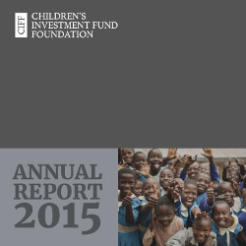The Children's Investment Fund Foundation, one of the UK's largest grant-givers, spent $2m (£1.4m) on legal fees to settle a dispute between two trustees who were going through a divorce.
CIFF was set up by Sir Christopher Hohn, a billionaire hedge fund manager, and Jamie Cooper in 2003. The couple divorced in 2014 after 15 years of marriage, with Cooper winning a £337m settlement. But both remain trustees of the charity.
The charity's recently published accounts for the year ending August 2015 state that: “During the year the trustees encountered exceptional governance difficulties arising from differences between two trustees, Sir Christopher Hohn and Ms Jamie Cooper.
“The board had to seek extensive legal advice to ensure that its decisions complied with the law, Charity Commission requirements and practice, and were in the best interests of the Foundation. The cost of this advice in the year ended 31 August 2015 was US$2,050k.”
In 2003 Hohn set up a hedge fund, The Children’s Investment Fund, which until 2013 donated the majority of its annual profit to the charity to build up an endowment of $4.4bn (£3bn).
Until recently it was chaired by Cooper, but she has now stepped down.
Grants increase
Total income at the foundation was up from $189m (£132m) to $246m (£172m), with income from its investments being the largest source at $240m (£168m), an increase of $56m (£39m) on the previous year.
It spent $251m (£175m) on its charitable activities, including $220m (£154m) on grant disbursements, which is 80 per cent higher than the previous year. It approved 38 new grants during the year, which have a multi-year value of $418m (£292m).
Last the year the foundation launched a transparency policy and will make all CIFF-funded evaluations of its projects publically available from now on.
The highest earner at the charity is paid between £370,000 and £380,000. There are 42 people at the charity earning more than £60,000. The average number of full-time equivalent employees during the year was 80.
New ethical investment policy
Its annual report also reveals that the charity has changed its investment policy and will divest from tobacco manufacturing and marketing companies and food companies that have not adopted the International Code of Marketing Breast Milk Substitutes.
It will also divest from companies that derive more than 10 per cent of revenue from extracting fossil fuels, excluding natural gas and companies that derive more than 10 per cent of revenue from extracting natural gas, unless they have adopted a business strategy and plan to cut emissions to limit climate change to 2 degrees Celsius.
“While the trustees do not wish to restrict the endowment’s investments to only those companies or sectors which reflect the foundation’s values and charitable objectives, they recognise that some investments in companies or sectors may be harmful to the foundation’s mission to transform the lives of poor and vulnerable children,” the report said.









